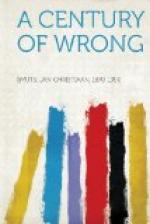[Sidenote: The Royal Commission.]
He appeals to the discussions which formed a prelude to the Convention of 1881. In the discussions, however, mention is only made of burgher rights or civil rights, with reference to which all possible equality has continuously existed since the Sand River Convention. To safeguard the equality of those civil as distinguished from political rights, Art. 12 of the Pretoria Convention provides “all persons (Her Majesty’s loyal subjects) will have full liberty to reside in the country with the enjoyment, of all civil rights, and protection for their persons and property.”
The period of the franchise was increased in 1882 from one year to five years, without, however, any protest from Her Majesty’s Government, and in 1884 it was provided in the new Convention of that year in the most express and clear way possible that:—
(Art. XIV.).—All persons, other than natives, conforming themselves to the laws of the South African Republic (a) will have full liberty with their families, to enter, travel, or reside in any part of the South African Republic; (b), they will be entitled to hire or possess houses, manufactories, warehouses, shops, and premises; (c), they may carry on their commerce either in person or by any agents whom they may think fit to employ; (d), they will not be subject, in respect of their persons or property, or in respect of their commerce or industry, to any taxes, whether general or local, other than those which are or may be imposed upon citizens of the said Republic.
In this way all white Uitlanders were guaranteed in their rights of free movement, ownership, and possession of property, trade, and commerce, and equal taxation with the burghers. There is no mention of political rights, nor has there ever been before this year—1899. The Government of the South African Republic would be acting strictly in terms of the Convention if it informed Mr. Chamberlain that it alone has to determine upon the Franchise, as being a question of a purely internal nature; and further, that in claiming the right in terms of that Convention to force the Government to adopt a particular Franchise Law Mr. Chamberlain is the party who is violating the Convention.
[Sidenote: The Bloemfontein Conference.]
The Government of the South African Republic, however, took up a higher position; the State President went to Bloemfontein for the purpose of discussing even internal affairs in a friendly spirit with the High Commissioner—inter alia—the question of the franchise, as he was actuated by the wish to consolidate and promote the peace of South Africa. [50] Sir Alfred Milner said there: “If the question could be settled upon a broad and firm basis, the tension would disappear and everything come right in time.” He has done his best latterly to prove that he did not say or mean anything of the kind, that the franchise question was only one of the burning internal matters in which Her Majesty’s Government interested itself, and that a favourable understanding about the franchise would in no way pave the way to an agreement as to the other points of difference.




